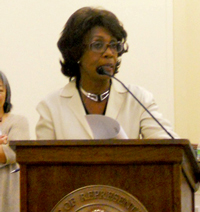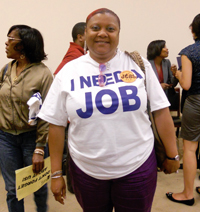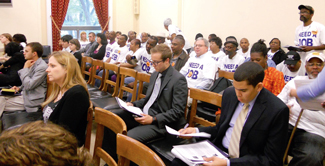-Staff Writer-

WASHINGTON (FinalCall.com) – “I need a job,” was the rallying cry May 25 on Capital Hill as people from around the country came to tell Congress to “Put America Back to Work.”
Put America Black To Work is the unofficial name for The Local Jobs for America Act introduced by Chairman George Miller (D-Calif.) of the House Education and Labor Committee. His proposed bill would create or preserve one million jobs.
“We are starting to see things turn around on Wall Street but not on the main streets of our municipalities in this country,” said Mayor Laurent Gilbert of Lewiston, Maine. “Two weeks ago, we had to make the decision to cut 21.5 positions, including firefighters, police officers and city workers from a staff of 345. We’ll continue to have to make such difficult choices if we can’t do something to create jobs now.”
From one compelling story to the next, from a jobless recent magna cum laude college graduate to a soon to be laid off certified nursing assistant, Americans told Congress something needs to be done now. The government needs to get involved directly with job creation in communities, they said.
“I’m the first person in my family to graduate from college,” said Rosemary Hicks, a 2010 Tuskegee University graduate with a bachelor of science in sales and marketing. She developed leadership skills through the NAACP student chapter and was student government association vice president.
“I’ve spent five months looking for a job and have applied for 30 jobs. I still haven’t found employment. I’m competing with other college graduates but also with other unemployed workers willing to take an entry-level job. America needs to pass the Local Jobs Act today,” she said.

Forum organizers say the Local Jobs for America Act (HR 4812) is the missing piece that could put significant numbers of people back to work through direct job creation. Nearly 100 workers came to D.C. for the congressional hearing and a forum, most were unemployed, shouted and clapped in support while wearing “I Need a Job” T-shirts.
Dr. Bernard Anderson represented the National Urban League president’s Council of Economic Advisors. “There are three points I want to make. First, the depth of this economic crisis has worsened the racial economic inequalities. It threatens to wipe out the gains of the ’90s. Second, the employment problem reflects a continuing major structural change in our economy, the link between economic growth and job creation. Over the past three recessions, we’ve had jobless creations. The economy grew but no jobs were created.”
“A healthy dose of public job creation is absolutely critical so all Americans will have a chance to work. There is nothing wrong with public job creation. When the private industry is unable to provide jobs, the public has an obligation to create jobs. There is nothing wrong with public jobs creation. We won’t have enough economic growth until 2013 or beyond to reach full employment at five percent,” he said.
While the speakers called on the government to do more, President Obama stood in the Rose Garden on the same day and said, “Now, government can’t create jobs, but it can help create the conditions for small businesses to grow and thrive and hire more workers.”
He also mentioned that America’s small businesses already create two out of three new jobs. His solution is for Congress to swiftly pass legislation to help small businesses create more jobs. The president’s small business bill would make $30 billion available to community banks specifically for loans to local small business owners. It would also provide funds for states to create or enhance their own small business lending incentive programs.
“From the middle of 2007 through the end of 2008, small businesses lost 2.4 million jobs,” said President Obama. “And because banks shrunk from lending in the midst of the financial crisis, it’s been difficult for small business owners to take out the loans they need to open up shop.”
During an interview with TV One host and CNN contributor Roland Martin on the Tom Joyner Cruise May 21, the Honorable Minister Farrakhan warned Blacks that the United States has no intentions of helping the entire country recover or get back on its feet. Some demographics, particularly Black men, are being deliberately disenfranchised from America’s wealth, he said, according to Rolling Out magazine, a weekly publication.

The Minister stressed that Blacks, particularly Black men, need to become entrepreneurs and the Black community as a whole must have “cooperative economics” and “pool our resources” in order to survive the economic downturn and thrive with any economic upturn.
“They have no intention of helping Black men. Corporations believe they can satisfy both minority requirements by hiring a Black woman instead of a qualified Black man,” he said.
Black institutions, the Minister continued, must be accountable and step outside of the comfort of the four walls of the church to address the needs of the people who surround and support their churches as churches did a generation ago.
“There’s a church on every corner. Preachers are everywhere and next to that church may be a crack house, and there’s prostitution and gang violence. We cannot stay in the church or the mosque with people who think they’re so holy. We have to get out into the streets where the problems are and deal with our young people,” Min. Farrakhan said to a rousing applause.
“We will have high levels of unemployment for the foreseeable future. The pain of unemployment has gotten worse. There are clear signs of danger ahead. The recovery act created 3.5 million jobs but during the period we lost 4 million,” said Christian Dorsey, director of the external and government affairs at the Economic Policy Institute.
“State and local governments are reducing spending. Critical expenditures in human and public services are getting cut–200,000 more jobs will be cut in states and local governments. More layoffs are coming. The public sector has been a place Blacks and Latinos could get jobs. The government needs to create one million jobs in the communities hardest hit to get the most bang for the public dollar.”
Present at the forum were several members of Congress, among participants were Congressional Black Caucus Chair Barbara Lee (D-Calif.); Rep. Lynn Woolsey co-chair, Congressional Progressive Caucus; Congressional Asian Pacific American Caucus Chair Mike Honda (D-Calif.), and Rep. Maxine Waters (D-Calif.).
“I understand what’s happening,” said Rep. Marsha Fudge (D-Ohio). “Government only has one job and that’s to take care of the people we serve. If we don’t vote for this,” she said shaking her head. “In my community, we were in a financial crisis before there was a financial crisis. I promise you I’m voting for this bill.”
Minnesota Democrat Keith Ellison sees funding as one of the bill’s challenges. “People are saying we can’t afford it. We can find the money if we want it. We can afford it. We can’t afford not to. There is a real cost to having people not work. People would rather work than get unemployment or welfare.”
“It’s not like we don’t have work that needs to be done. We had a bridge fall down in Minnesota. We need to take care of America,” he said.
The forum was co-sponsored by the Congressional Black Caucus, Congressional Progressive Caucus, Congressional Asian Pacific American Caucus and the Jobs Task Force of the Democratic Caucus.
Still with all the calls for more government intervention, the question is can such legislation be passed with vocal opposition to the president, distrust of Congress, do nothing Republicans and complaints that the Obama administration is already expanding government and spending far too much.












